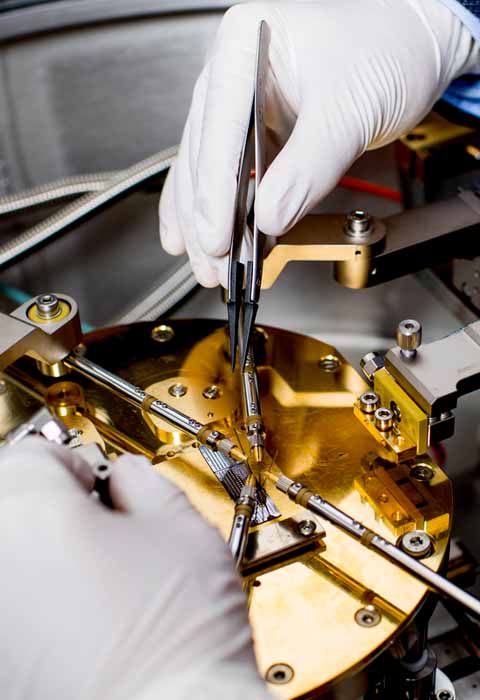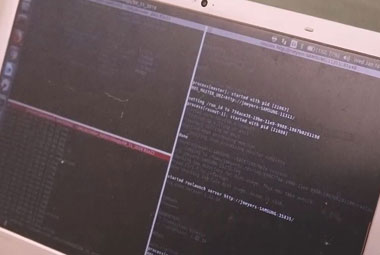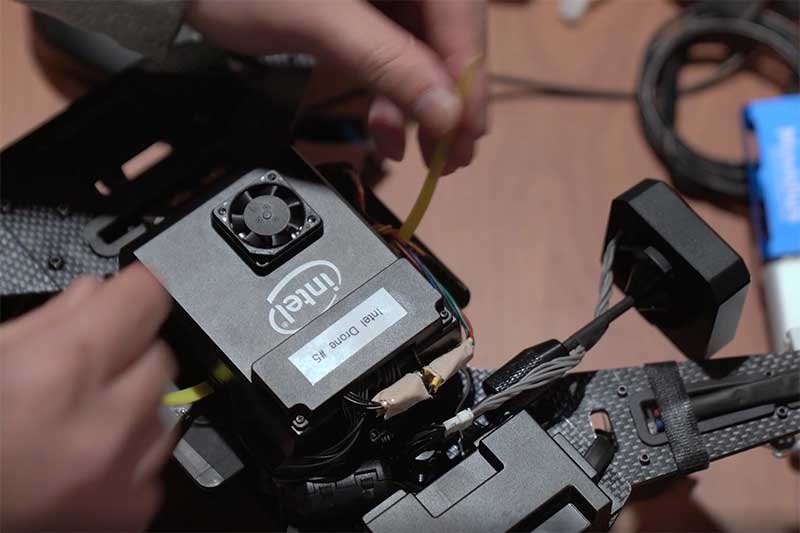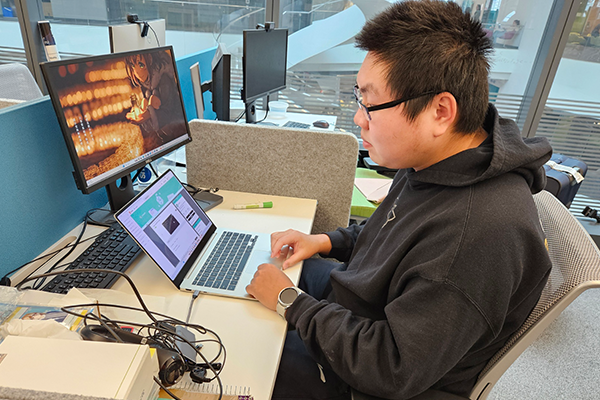
Master of Science in Electrical & Computer Engineering
Master of Science in Electrical & Computer Engineering
Overview
As an MS in Electrical and Computer Engineering (Master of Science) student, you have the flexibility to specialize in an area of interest with eight concentrations (see below), research areas, and experiential learning options. You will receive deep fundamental and practical knowledge in the various disciplines of electrical and computer engineering through a strong curriculum and research opportunities.
Research ranges from the design, analysis, and optimization of high-performance computing systems, to the fabrication of cutting-edge microelectromechanical actuators, to new research frontiers on smart power grids, metamaterials, biomedical signal processing, and communication systems. Students also have the opportunity to gain up to eight months of professional experience as part of the academic curriculum though our top-ranked cooperative education program. Located in Boston, a hub of high tech, biotech, academia, the department has strong ties to local industry and the world-famous hospitals and medical centers, and is involved in many joint research projects with them, others across the nation, and has significant government-funded research.
The department educates the next generation of highly skilled engineers and researchers with necessary skills to address the future needs of industry, government, and humanity.
Innovative Curriculum - MS in Electrical and Computer Engineering
Some full-time students are supported by research assistantships which are awarded competitively during the application process, and which are occasionally available at other times. Part-time students will find that many graduate courses are offered by video streaming to allow them to maintain a full-time career.
The program may be pursued full time or part time. Part-time students will find that many graduate courses are offered by video streaming to allow them to maintain a full-time career.
Students also select from 8 concentrations to personalize their education.
All concentrations of the MS in Electrical and Computer Engineering are offered in Boston.
The Hardware and Software for Machine Intelligence concentration and the Computer Vision, Machine Learning, and Algorithms concentration are also available in Seattle, WA.
Note: a subset of electives may be offered at the regional campus.
Northeastern electrical and computer engineering faculty and graduate students conduct world-class research at the forefront of electrical and computer engineering. The department is home to experts in a variety of disciplines spanning the field of electrical and computer engineering. Our faculty and graduate students are deeply connected with the intellectual community of Boston and Cambridge. Our department features numerous collaborations with top-tier institutions such as MIT, Harvard, Draper Labs, and Massachusetts General Hospital to name just a few. Our research is also funded by numerous federal agencies. Additionally, Northeastern is home to several cutting-edge labs and facilities in areas of electrical and computer engineering such as the Institute for Experiential Robotics, the Institute for the Wireless Internet of Things, the Institute for Experiential AI and many others in the areas of health, security/cybersecurity, and sustainability.
View our department research areas.
View our research centers.
[Listed by concentrations]
- Communications, Control, and Signal Processing
- An ability to study engineering problems and to apply deterministic or statistical tools or techniques to efficiently produce computational, mathematical or physical models, or design experiments, for solving problems.
- An ability to apply analytical or numerical methods to study the computational, mathematical or physical models, or if appropriate the results of experiments, to produce solutions or designs.
- An ability to evaluate the efficiency or adequacy of the solutions using analytical, computational, or experimental techniques.
- Computer Systems and Software
- An ability to study engineering problems and to apply deterministic or statistical tools or techniques to efficiently produce computational, mathematical or physical models, or design experiments, for solving problems.
- An ability to apply analytical or numerical methods to study the computational, mathematical or physical models, or if appropriate the results of experiments, to produce solutions or designs.
- An ability to evaluate the efficiency or adequacy of the solutions using analytical, computational, or experimental techniques.
- Computer Networks and Security
- An ability to study engineering problems and to apply deterministic or statistical tools or techniques to efficiently produce computational, mathematical or physical models, or design experiments, for solving problems.
- An ability to apply analytical or numerical methods to study the computational, mathematical or physical models, or if appropriate the results of experiments, to produce solutions or designs.
- An ability to evaluate the efficiency or adequacy of the solutions using analytical, computational, or experimental techniques.
- Computer Vision, Machine Learning, and Algorithms
- An ability to study engineering problems and to apply deterministic or statistical tools or techniques to efficiently produce computational, mathematical or physical models, or design experiments, for solving problems.
- An ability to apply analytical or numerical methods to study the computational, mathematical or physical models, or if appropriate the results of experiments, to produce solutions or designs.
- An ability to evaluate the efficiency or adequacy of the solutions using analytical, computational, or experimental techniques.
- Electromagnetics, Plasma, and Optics
- An ability to study engineering problems and to apply deterministic or statistical tools or techniques to efficiently produce computational, mathematical or physical models, or design experiments, for solving problems.
- An ability to apply analytical or numerical methods to study the computational, mathematical or physical models, or if appropriate the results of experiments, to produce solutions or designs.
- An ability to evaluate the efficiency or adequacy of the solutions using analytical, computational, or experimental techniques.
- Hardware and Software for Machine Intelligence
- An ability to study engineering problems and to apply deterministic or statistical tools or techniques to efficiently produce computational, mathematical or physical models, or design experiments, for solving problems.
- An ability to apply analytical or numerical methods to study the computational, mathematical or physical models, or if appropriate the results of experiments, to produce solutions or designs.
- An ability to evaluate the efficiency or adequacy of the solutions using analytical, computational, or experimental techniques.
- Microsystems, Materials, and Devices
- An ability to study engineering problems and to apply deterministic or statistical tools or techniques to efficiently produce computational, mathematical or physical models, or design experiments, for solving problems.
- An ability to apply analytical or numerical methods to study the computational, mathematical or physical models, or if appropriate the results of experiments, to produce solutions or designs.
- An ability to evaluate the efficiency or adequacy of the solutions using analytical, computational, or experimental techniques.
- Power Systems
- An ability to study engineering problems and to apply deterministic or statistical tools or techniques to efficiently produce computational, mathematical or physical models, or design experiments, for solving problems.
- An ability to apply analytical or numerical methods to study the computational, mathematical or physical models, or if appropriate the results of experiments, to produce solutions or designs.
- An ability to evaluate the efficiency or adequacy of the solutions using analytical, computational, or experimental techniques.
MS thesis students should have a research advisor one year after their matriculation.
Over 15 graduate certificates are available to provide students the opportunity to develop a specialization in an area of their choice. Certificates can be taken in addition to or in combination with a master’s degree, or provide a pathway to a master’s degree in Northeastern’s College of Engineering. Master’s programs can also be combined with a Gordon Engineering Leadership certificate. Students should consult with their faculty advisor regarding these options.
Gordon Institute of Engineering Leadership
Students may complete a Master of Science in Electrical and Computer Engineering in addition to earning a Graduate Certificate in Engineering Leadership. Students must apply and be admitted to the Gordon Engineering Leadership Program in order to pursue this option. The program requires fulfillment of the 16-semester-hour curriculum required to earn the Graduate Certificate in Engineering Leadership, which includes an industry-based challenge project with multiple mentors. Further semester hours may vary based on Electrical and Computer Engineering concentration.
Concentrations
At the time of applying to the MS in Electrical and Computer Engineering program, the applicants select their preferred track as well as their concentration of study from the eight concentrations offered by the ECE department.
This concentration focuses on the development of methodologies and algorithms for designing communications, control, and signal processing applications. Common career outcomes in this concentration include positions in wireless and mobile communications, robotics, image processing, medical imaging, and navigation/localization industries.
A specialization in computer networks and security prepares students for multiple roles, including wired/wireless network analysis and protocol design, sensor network design, software and hardware security, and Internet of Things (IoT).
Students who learn about computer systems and software often pursue careers including microprocessor design and verification, embedded hardware and software development, performance analysis and modeling, advanced computer system design, and operating system design.
By completing coursework in computer vision, algorithmic approaches, machine learning, pattern recognition, big data analytics, and visualization, students are prepared for careers in industries such as vision systems, big data analytics and mining, vision/image processing, visualization systems and software, and general algorithmic approaches to problem-solving.
This area of engineering is concerned with the theory and applications associated with the launching, propagation, confinement, and control of electromagnetic, acoustic, and optical wave fields. This concentration prepares students for careers in fields such as antenna engineering for wireless systems, radar, sonar, wavefield imaging, optics, photonics, and magnetics.
As artificial intelligence solutions become more prevalent, these multifaceted systems engineers can bridge the gap between theory, software, and hardware. Students go on to various careers creating and implementing solutions fluent in theoretical and software generation aspects of technology.
Students learn fundamental theories, design approaches, fabrication methods, and measurement techniques for various emerging products with electronic components. The career paths for graduates of this concentration include VLSI and custom design ASIC, MEMS design, and smart material design industries.
This concentration examines the secure and efficient operation of electric transmission and distribution systems and the design, modeling, and control of power converters and renewable energy systems. Those who chose this concentration eventually pursue careers related to modeling and analyzing large-scale power and smart grids, electric vehicle, and clean energy industries.
Experiential Learning
Northeastern combines rigorous academics with experiential learning and research to prepare students for real-world engineering challenges. Northeastern is an R1 research institution, rated among universities with the highest research activity.
The Cooperative Education Program, also known as a “co-op,” is one of the largest and most innovative in the world, and Northeastern is one of only a few that offers a co-op program for graduate students. Through this program, students gain up to eight months of professional experience employed in their field of interest as part of the academic curriculum, giving them a competitive edge upon graduation. The College of Engineering has over 3,000 co-op employer partners globally. Our dedicated team of co-op coordinators prepare students for the co-op experience through resume building, developing interview skills, and guiding professional development.
Academic Advising
The Academic Advisors in the Graduate Student Services office can help answer many of your questions and assist with various concerns regarding your program and student record. Use the link below to also determine which questions can be answered by your Faculty Program Advisors and OGS Advisors.
Admissions & Aid
Ready to take the next step? Review degree requirements to see courses needed to complete this degree. Then, explore ways to fund your education. Finally, review admissions information to see our deadlines and gather the materials you need to Apply.




